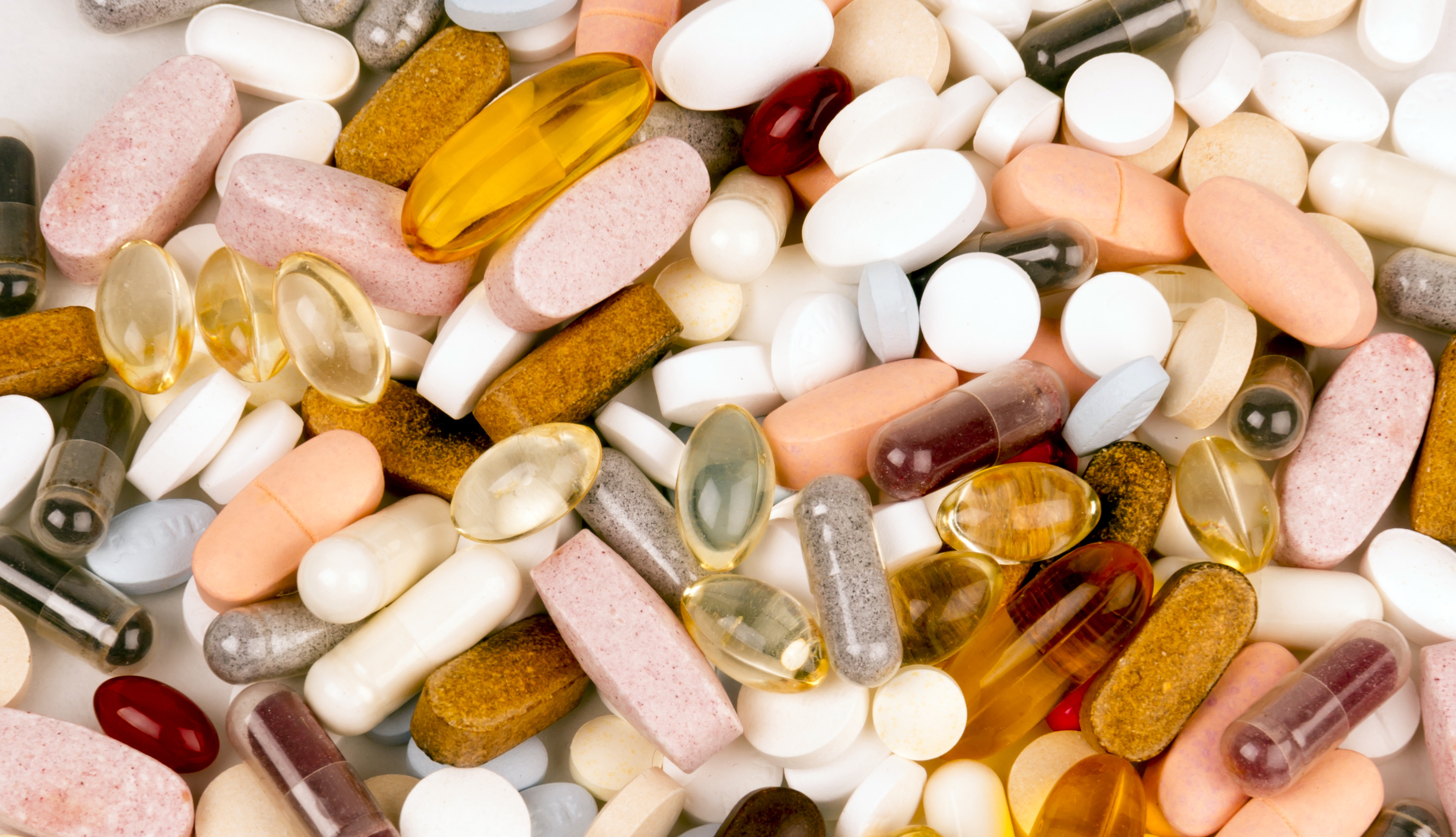
The vitamin isle can be an overwhelming place. I’m on a mission to simplify the wide-open question: should I be taking supplements? If so, what are the most common supplements used to optimize my health? I’ve done a lot of research on supplements to put this post together and in doing so, I learned
Three Important Nuggets that Apply to Everyone:
- Food is your best medicine. You can’t supplement your way out of a poor diet.
- One size does NOT fit all. Your personal biochemistry matters. Always take your individual needs and health case into consideration when considering supplements.
- Quality is UBER important. Not all vitamins are created equal. In fact, the FDA does not regulate vitamin ingredients. Look for pharmaceutical grade no matter what you’re taking (even things like melatonin). “Natural” doesn’t mean a thing — most drug store vitamins are packed with unlisted fillers and binders. For the highest quality, look for the “USP Verified Seal.”
Do You Have Deficiencies?
First and foremost, you should consult your doctor. This post is limited to my personal experience. Which leads me to my first recommendation: consult a doctor. If you missed my post on Important Questions to Ask Your Doctor at your Annual Physical, a general blood test for deficiencies is the first place to start. The good news: this test is covered under your insurance and is routine. The bad news: general MD practitioners have a very wide “healthy range” for most of the common deficiencies they test for so even though you may be within the healthy spectrum, you could be functioning at less than optimal ranges which could be improved through supplementation. If you’re really committed, the solution is to consult a functional medicine practitioner to run genetic tests help determine what exactly you are lacking to determine what you should be supplementing with.
Essential Guide to Vitamins:
Once you’ve established a bench mark – are you lacking in certain areas? Here is a list of the most common supplements that people struggle to remain optimal with by simply eating a well balanced diet.
Vitamin D: Vitamin D puts the “essential” in this essential guide to vitamins. Since Vitamin D is fat-soluble, it acts more like a hormone than a vitamin by regulating hundreds of super important pathways in your body. Aside from your thyroid hormones, this vitamin is the only other thing every single cell of your body needs in order to function properly. Vitamin D is also known as the “sunshine vitamin” because our bodies absorb it from the sun but if you’re living in a town like… umm, say PITTSBURGH… supplementing could be key to maintain optimal ranges of vitamin D. Your PCP will tell you anywhere between 50 to 60 ng/mL is healthy but functional medicine doctors aim for an optimal range of 60 to 80 ng/mL.
SJP Approved Vitamin D Supplements: Pure Encapsulations more recommendations here. Dr. Will Cole makes stellar supplements (he’s a local Pittsburgh functional medicine practitioner) but they’re a bit expensive. Take between 2,000 to 6,000 IU depending on your starting point.
Magnesium: This mineral is needed for over 300 crucial biochemical reactions in our body. Up to 80% of the population is deficient in Magnesium leading to problems including: sleep, anxiety, muscle cramps, migraines, and brain fog. Struggling with any of those things? Try supplementing with Magnesium. I take this every night before bed. It helps with keeping digestion aka POOP regular. I swear by it, so much so, that I wrote a post entirely dedicated to magnesium.
SJP Approved Magnesium Supplements: Pure Encapsulations Magnesium Citrate and/or Natural Calm Magnesium Powder. Recommended dosage is 350 mg before bed to promote better sleep by relaxing and helping calming brain neurotransmitter GABA in your brain.
Probiotics: A healthy gut = a healthy you. The gut has been touted as the second brain; it controls so much more than just digestion and is the foundation for almost all aspects of our health (more on gut health here). The gut contains millions of bacteria, and without a proper balance of good bacteria, it can affect everything from your hormones to your weight. It’s important to incorporate gut healthy fermented foods like kimchi, kefir, sauerkraut, apple cider vinegar, and kombucha, depending on the level of your gut permeability, you may need an additional boost from a probiotic supplement. Also, eating “prebiotic” foods like garlic, asparagus, and onions, help to make the probiotic supplements more bioavailable to your body for effective absorption and development of good gut bacteria.
SJP Approved Probiotics: Take probiotics containing “Lactotbacilli” and “Bifidobacteria” (these strands are shown to reduce inflammation) with at least 10 billion CFU per day. This is the product I use but their are a lot of great products on the market.
Omega-3 Fish Oil: healthy fats are essential for optimal brain health, considering that you brain is made up of 60% fat. Symptoms of a body/brain deprived of fat can include brain fog, fatigue, depression, and anxiety. So, if you’re not getting enough healthy fats, specifically from wild-caught seafood (salmon, tuna, sardines, krill, etc), you may want to consider supplementing with an omega-3 supplement. One study showed that taking 2000 mg omega-3 experienced a significant reduction in anxiety compared to placebo patients in the study. Omega-3’s have also been seen to aid in uplifting mood from S.A.D (season affective disorder) which if you’re from Pittsburgh, like me, you know is REAL.
SJP Approved Omega-3’s: I like this Omega 3 supplement – it’s highly potent. This product is a one pill a day multi (it has more than just omega 3). Take these pills with a fat-rich meal, it helps with absorption. This supplement has Vitamin D in it as well (double wammy). Recommended intake: 2250 mg EPA / 750mg DHA per day.
Spirulina: This blue-green algae usually comes in the form of a powder. It’s been touted as, “the superfood of the sea.” Spirulina is a great source of Iron, phytonutrientst, and iodine, all commonly lacking in the modern Western diet.
SJP Approved Spirulina: Take 3 grams per day by adding a teaspoon of this powder to your smoothies or lattes.
Turmeric: Turmeric is a powerful anti-inflammatory nutrient, helping combat internal inflammation — an issue at the root of almost every chronic illness today.
SJP Approved Turmeric: Take up to 2 grams turmeric per day for routine inflammation maintenance (which can be achieved just by cooking with the spice). Take up to 10 grams if you’re fighting off high levels of inflammation. Black Pepper (Piperine) increases the bioavailability of the turmeric by 2,000 percent, so find a supplement that includes both if you need to manage your inflammation.
B-Complex: B vitamins are critical to the biochemical process that happens in your body more than 1 billion times every day – responsible for keeping you alive and properly detoxing. There are so many different types of B vitamins, so it’s important to get a well0rounded amount of each.
SPJ Approved B Vitamins: The best B-vitamin supplement is a B-complex vitamin containing methylation. Look for activated ingredients in your B vitamin like L-5-MTHF, P5P, and B12.
Vitamin C: This vitamin is most commonly associated with the common cold. It’s immune boosting properties were found to reduce systems up to 30 percent. Most people get enough Vitamin C from their diet but if you’re feeling like you’re coming down with the cold or flu, supplement 1,000 to 4,000 mg Vitamin C combined with Zinc to boost it’s immune boosting properties.
Vitamin A: Vitamin A is important for a strong immune system. Vitamin A deficiencies have been linked to autoimmune disease, which is on the rise is a real way. Natural ways to incorporate Vitamin A include carrots & sweet potato but absorption is more efficient in foods like fish liver oil or retinyl palmitate.
SJP Approved Vitamin A Supplement: If you’re struggling with a deficiency in Vitamin A, take between 2,000 to 10,000 IU per day of supplements like this one (dosage depends on your starting point).
Vitamin K2: K2 is one of the most common nutrient deficiencies in the Western diet. There are several types of K2, look for the MK-4 version. This version regulates gene expression in specific ways that no other form of Vitamin K does. MK-4 plays an exclusive role in cancer protection and sexual health.
SJP Approved K2 Supplement: Take 100 to 200 mcg per day. Take this fat-soluable vitamin with your vitamin D to keep levels from going too high as well as to make the Vitamin D more bioavailable. Take these supplements with fat rich meals like avocado, salmon, a bit of butter or coconut oil in your meal.
Collagen: A hot and trendy topic! This protein is found in our tendons, skin, cartilage, bones, and blood vessels. It’s needed for a healthy metabolism and our own collagen production. Collagen is comprised of glycine, proline, and hydroxyproline – we require 15 rams of glycine per day and most of us only get 3 grams from our modern diet.
SJP Approved Collagen: Take 8 grams per day in the form of collagen peptides in your coffee, water, tea, or smoothies. You can’t even taste it, it dissolves nicely in water. Look for brands that source grass-fed and pasture-raised protein sources.
In Summary:
You can get many of these nutrients in the form of a high-quality multivitamin but there are a few that you will need to supplement separately. If you’re looking for a multi, look for these noted vitamins. Remember, food is your very best medicine and before supplementing with these nutrients, you should have a doctor run tests to measure your levels and advise on where to supplement with these pills/powder.
Sources:
https://drwillcole.com/make-vitamins-supplements/
mindbodygreen.com


